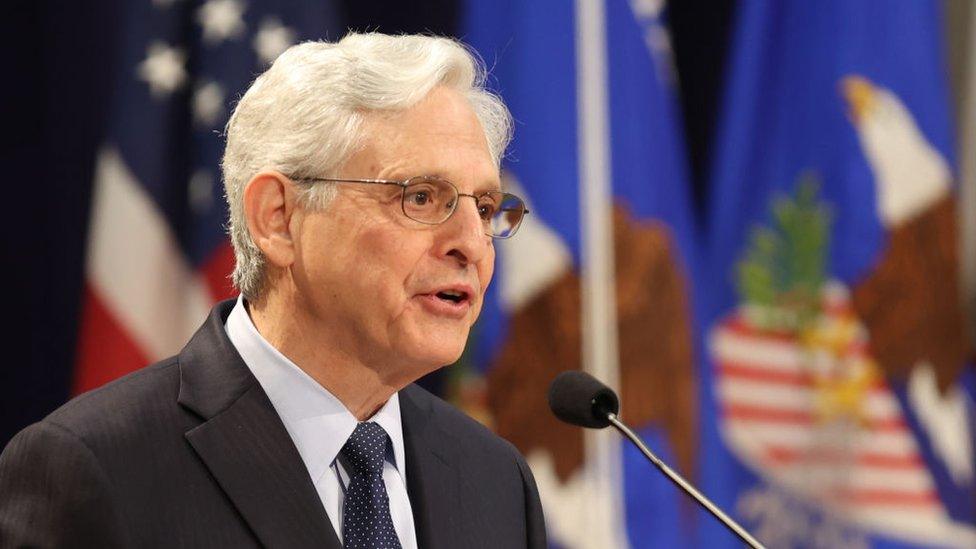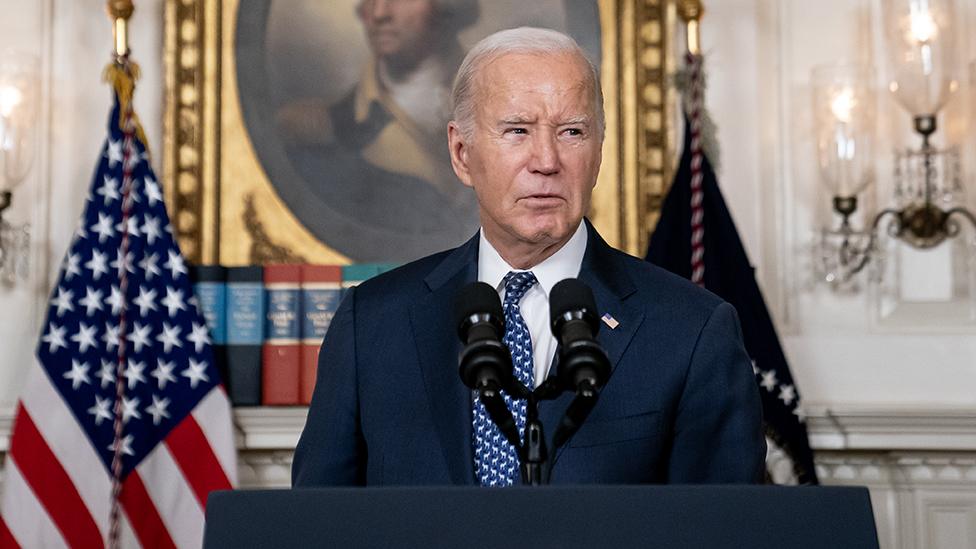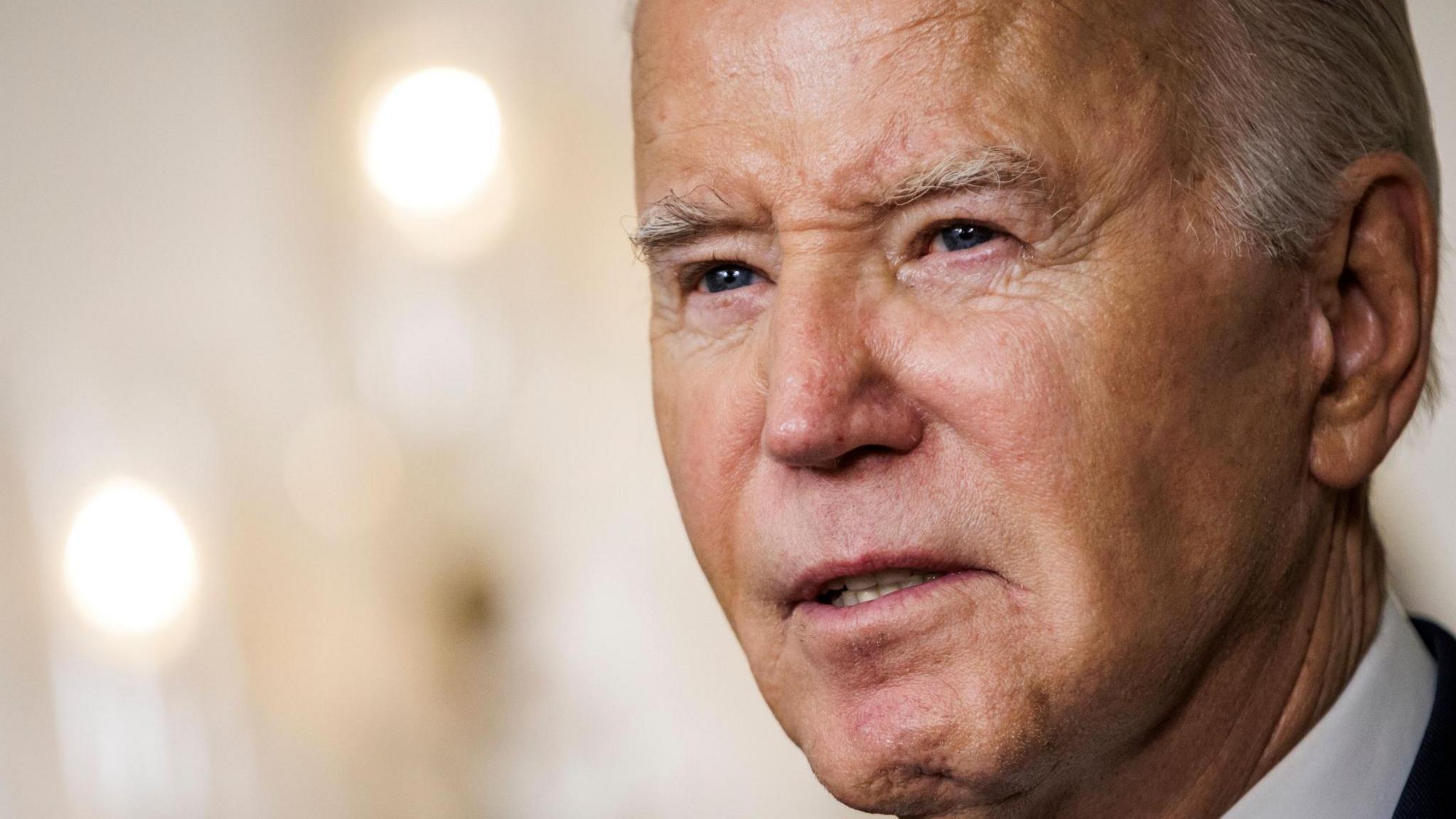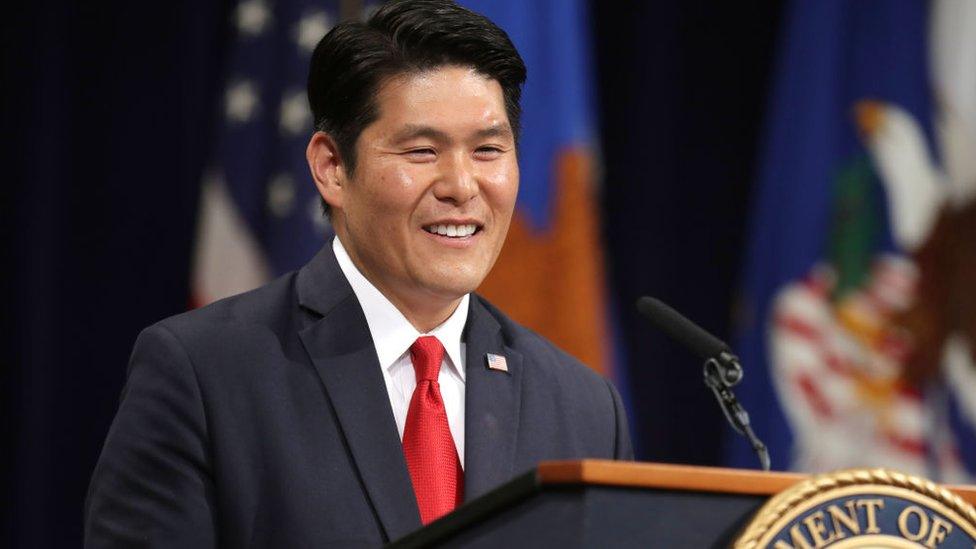Merrick Garland: Republicans back contempt charges over Biden special counsel tapes
- Published

US Attorney General Merrick Garland criticised Republicans for "a series of unprecedented and frankly, unfounded attacks" on his justice department
Two panels in the Republican-controlled US House of Representatives have backed holding Attorney General Merrick Garland in contempt of Congress.
The House Judiciary and Oversight Committees made their recommendations after Mr Garland advised President Joe Biden to defy their legal demands.
Republicans had demanded the release of audio tapes from a probe of Mr Biden's handling of classified documents.
The findings have raised questions about the president's memory and age.
The Judiciary Committee's 18-15 vote and the Oversight Committee's 24-20 vote took place on Thursday entirely along partisan lines.
Their actions advance the contempt resolution against Mr Garland to the full House chamber, which means that the country's top prosecutor could face a potential criminal referral.
The effort to hold the US attorney general in contempt stems from a 345-page report released by Special Counsel Robert Hur in February, the result of a year-long inquiry into Mr Biden retention of classified documents after leaving the vice-presidency in 2017.
The Garland-appointed prosecutor said that no criminal charges against Mr Biden were warranted, despite the 81-year-old "willfully" retaining classified materials as a private citizen.
Mr Hur's report noted that the special counsel believed prosecutors would struggle to secure a conviction against Mr Biden, as jurors would likely view him as a "well-meaning, elderly man with a poor memory".
That characterisation came after the president sat through five-hour interviews across two days last October with Mr Hur's team. The report says that Mr Biden was unable to recall certain details relevant to the investigation.
Mr Hur, a Republican, recounted that Mr Biden had also struggled to recall milestones in his own life, including the years of his vice-presidency and when his oldest son Beau had died from cancer.
The report's release was a difficult moment for Mr Biden and his fledgling reelection campaign. It immediately stressed one of Mr Biden's biggest political weaknesses - voter concerns about his age and lucidity.
The White House and many Democrats have pushed back on Mr Hur's characterisation, alleging that the special counsel's claims went beyond the scope of his appointment and were misleading.
"I'm well-meaning, and I'm an elderly man. And I know what the hell I'm doing," the president said angrily at an impromptu press conference.
Watch: Biden responds to special counsel - "I'm elderly and know what the hell I'm doing"
Mr Hur defended his report as "necessary, accurate and fair" during a congressional hearing a month after its release.
Congressional Republicans have pushed to learn more about the report, putting pressure on the US Department of Justice to share full transcripts of the interview and other relevant documents.
But Mr Garland wrote a letter to Mr Biden on Wednesday that audio tapes of his interview "fall within the scope of executive privilege" - giving the White House legal grounds to withhold their release.
Executive privilege is a legal authority that allows the president and others within the executive branch to keep certain records or communications under wraps, blocking Congress or the judiciary's access to them.
Mr Garland sent another letter on Thursday to the Republican chairmen of the judiciary and oversight panels. The letter said that the justice department would not release the recordings and criticised the committee leaders for "a series of unprecedented and frankly, unfounded attacks" on his department.
Republicans, who allege the Biden administration is "weaponising the government" against former President Donald Trump, have launched a range of probes in recent months.
But Mr Garland noted the president had fully co-operated with the department's criminal probe and sat voluntarily for the interview.
In later remarks to reporters, he slammed "this effort to use contempt as a method of obtaining our sensitive law enforcement files" as contributing to "an atmosphere that puts our agents and prosecutors at risk".
Mr Biden confirmed he was blocking the release of the tapes in a separate letter from his White House counsel to the committee chairmen on Thursday morning.
"The absence of a legitimate need for the audio recordings lays bare your likely goal - to chop them up, distort them, and use them for partisan political purposes," it said.
Watch: Robert Hur defends his report as 'necessary, accurate and fair'
It prompted Republican lawmakers to move ahead with their contempt measure.
"The transcript of the interview was released months ago," Harriet Hageman, who sits on the judiciary panel, wrote in a post on X.
"What is so damning in the audio that this administration is afraid to release them?"
James Comer, the oversight panel's top Republican, said Mr Biden and his advisers "clearly fear" the release of the recordings "because it will again reaffirm to the American people that President Biden's mental state is in decline".
Mr Comer's committee did not meet until later on Thursday, as several of its Republican members had travelled to New York to show their support for Mr Trump in his ongoing criminal trial, and descended into a chaotic shouting match ahead of its late-night vote.
The contempt resolution now goes to the full House, which Republicans currently control by a single seat. It is unclear if they have the votes to hold Mr Garland in contempt.
If they are successful, Mr Garland will join his two recent predecessors - Bill Barr, who served under Trump, and Eric Holder, who served in the Obama administration - to face a contempt charge.
Neither of those men ultimately faced criminal charges.
Related topics
- Published9 February 2024

- Published9 February 2024

- Published9 February 2024

- Published12 March 2024
